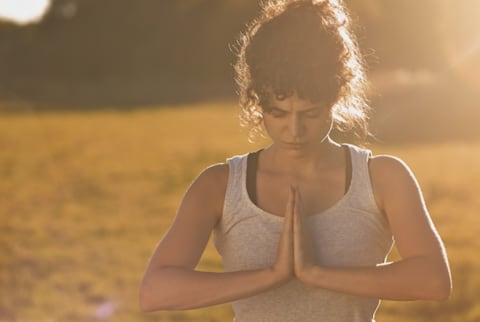Advertisement
8 Widely Held Beliefs You'll Reconsider After You Start Meditating


Daily meditation, like many other foundational practices, can uproot and shed light onto some of the nearest and dearest beliefs we hold about ourselves and the world we live in.
Over time and practice, some of those beliefs will be reshaped, while others might be replaced completely by much higher levels of understanding that you will inevitably experience within.
My 15 years of meditating have influenced me to re-examine several of my most strongly-held beliefs about how life works, and my place in it.
Here are some of the more commonly held beliefs that I’ve heard other long-term meditators bring into question after their first few years of daily meditation:
1. “Happiness is a choice.”
Meditating regularly makes you realize that happiness is actually less of a choice and more of a byproduct of consistent inner work. Think of it like chopping down a tree. Your consistent meditation is like swinging an ax into the tree trunk of despair. Eventually it falls, whether you wanted it to or not.
This is why the illusion of choice-based happiness is often fleeting, and hinges on outcomes appearing to be favorable, whereas true inner happiness sustains itself throughout the ever-changing emotional landscape of life. You know you're stabilizing true happiness when you have more of a desire to go with the flow, and less of a need to control people, places and outcomes.
2. “I don’t have time to meditate.”
Prior to meditating, many people assume they don’t have the extra time needed in order to meditate; that is, until they begin seeing how meditation refunds them back the time they spend doing it.
As stated above, meditation typically makes you a happier person (whether you like it or not!) and happy people tend to sleep better, stay healthier and make better life choices. When you’re happier and healthier you can get more accomplished, with extra time to spare for family and friends, creative pursuits and of course, more meditation.
3. “I’ve peaked.”
Have you felt that you're already as fulfilled as you’re ever going to be? Or that life is hard, and people are selfish — or maybe that you’ve seen it all? Perhaps you’ve also resigned yourself to having low expectations with people, or you constantly brace yourself for disappointment?
But when you start meditating, you slowly begin to realize that everything you’ve been experiencing was just the tip of the iceberg. Upon closer inspection, life is actually full of joy, amazement and endless wonder. You can see and experience the subtle play and display of nature all around you, and it’s magical.
If someone doesn’t agree with you, chances are you'll have an easier time accepting that too. After all, the truth of life becomes different as you experience more expanded states of awareness.
4. “My greatest asset is time.”
Time is known to be the ultimate equalizer because we all get the same number of hours each day. But what’s even more valuable than being in control of your time is having more adaptation energy, because one thing's for certain — we’re all going to experience a lot of change in this life. Every single day.
For those of us who can’t adapt to the change, life will become unbearable. In my experience, meditation increases your innate ability to adapt to the ever-changing world. Often, it’s not the world around you that changes when you start meditating, but your perspective about it. As a result you’ll be able to stop taking things so personally, which will cut down the amount of over-reacting, maladapting, and self-imposed suffering. This will simultaneously allow you to bask in the wonder of your life.
5. “Making more money is the answer.”
We’ll often pay lip-service to the belief that money can’t buy happiness. But if we're being honest with ourselves, our actions don’t always back up our words. In the day-to-day, many people live as though more money is the answer to everything. They'll sacrifice relationships, personal development activities, working out, and eating healthy, all in the name of working harder to make more money.
Meditating doesn’t make you less concerned with money but rather, it helps you prioritize your experiences. You'll place more emphasis on activities that are important for building and sustaining happiness and fulfillment. Your priorities will shift to spending more time with family, cultivating deeper friendships, exercising and going out in nature.
After meditating, you may even consider taking a job that pays a little less, but ultimately proves to be more fulfilling. Maybe you'll even spend some time volunteering. Meditating helps you see that the real currency of life is happiness itself, and how not meditating is like leaving money on the table.
6. “There’s an app for everything.”
There’s Twitter for seeing what news topic is trending, Yelp for finding out what restaurants have the best reviews, and Google Maps to guide you.
But there is no app for letting you know what is the right thing to do in the myriad of challenging life situations we all face on a regular basis.
Part of the reason why anxiety is so rampant in our society is because there’s too much noise to hear the subtle intuitive messages emanating from within. Meditation helps to turn down the volume on that incessant noise, and amplify the small but powerful voice of intuition. As any regular meditator knows, the best answers are found in the silence.
7. “Problem-solving is hard.”
Meditation is known to expand consciousness, which makes it one of the only practical solutions to the dilemma Einstein warned us about: "You can’t solve a problem from the same state of consciousness that created the problem."
Meditating regularly has been shown to activate an internal rest network that causes the mind to think more clearly and efficiently. In other words, as your mental awareness expands, you are better positioned to come up with the answers to your biggest, most challenging problems.
It’s like when you try to remember something, and you can’t. But when you forget about it for a while and go on to something else, the answer just pops up into your awareness. Meditation turns this into such a frequent occurrence for problem solving that you can gladly move onto something else with the confidence of knowing the best answer will come when it needs to.
8. “I can suffer in isolation.”
Our emotional state is contagious. When we’re unhappy, we feed unhappiness out into the world. And when we’re happy we contribute more happiness in the world. The world is a reflection of our collective emotional states. If we want to live in a peaceful, happy world, we must do what it takes to become peaceful and happy inside.
Otherwise, we are setting ourselves up for suffering by looking for it in others. When we increase our suffering, we're actually adding to the world's problems. Meditation makes you more peaceful, and therefore you become a happier, more productive citizen of the world.

Light Watkins is a Santa Monica–based Vedic Meditation teacher, mindbodygreen class instructor, TEDx speaker, and author of Bliss More, How to Succeed in Meditation Without Really Trying. He grew up in Montgomery, Alabama, and graduated from Howard University with a bachelor's in communications. Watkins recognized his passion for teaching meditation after meeting his Guru in 2002. Following years of daily meditation, Vedic studies, and apprenticeship, he traveled to India to be trained in the ancient ways of teaching meditation. His students have used meditation to treat symptoms of PTSD, hypertension, sleep deprivation, anxiety, depression, and cancer.
More from the author:
A Meditation Expert's 14-Day Guide
Check out 14 Days To A Daily Meditation Practice - Yes, It's That Easy!
More from the author:
A Meditation Expert's 14-Day Guide
Check out 14 Days To A Daily Meditation Practice - Yes, It's That Easy!

Light Watkins is a Santa Monica–based Vedic Meditation teacher, mindbodygreen class instructor, TEDx speaker, and author of Bliss More, How to Succeed in Meditation Without Really Trying. He grew up in Montgomery, Alabama, and graduated from Howard University with a bachelor's in communications. Watkins recognized his passion for teaching meditation after meeting his Guru in 2002. Following years of daily meditation, Vedic studies, and apprenticeship, he traveled to India to be trained in the ancient ways of teaching meditation. His students have used meditation to treat symptoms of PTSD, hypertension, sleep deprivation, anxiety, depression, and cancer.
Watch Next
Enjoy some of our favorite clips from classes
Enjoy some of our favorite clips from classes
What Is Meditation?
Mindfulness/Spirituality | Light Watkins
Box Breathing
Mindfulness/Spirituality | Gwen Dittmar
What Breathwork Can Address
Mindfulness/Spirituality | Gwen Dittmar
The 8 Limbs of Yoga - What is Asana?
Yoga | Caley Alyssa
Two Standing Postures to Open Up Tight Hips
Yoga | Caley Alyssa
How Plants Can Optimize Athletic Performance
Nutrition | Rich Roll
What to Eat Before a Workout
Nutrition | Rich Roll
How Ayurveda Helps Us Navigate Modern Life
Nutrition | Sahara Rose
Messages About Love & Relationships
Love & Relationships | Esther Perel
Love Languages
Love & Relationships | Esther Perel

















